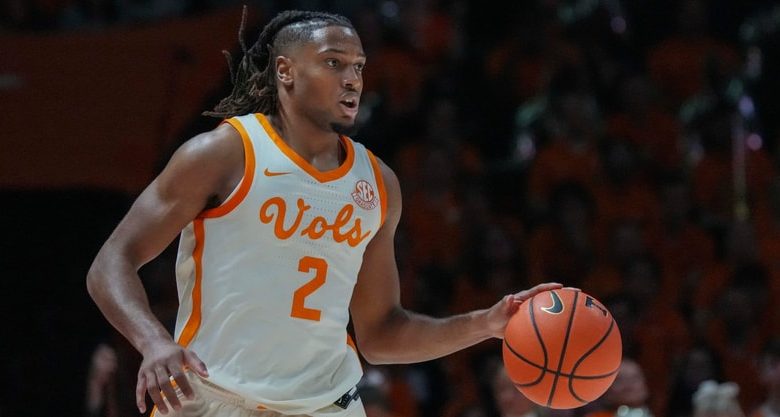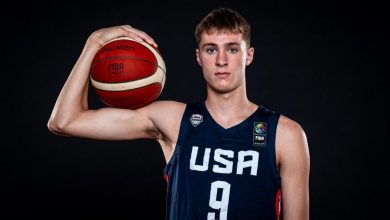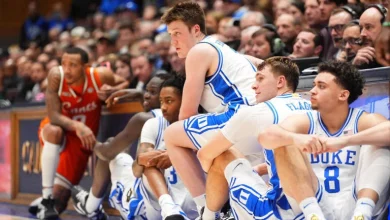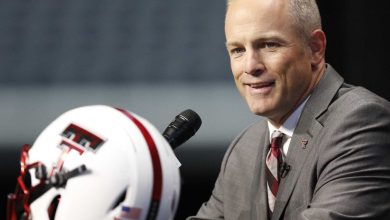ESPN projects Tennessee Vols guard Chaz Lanier to land with ‘rising young team with upside’ on Wednesday in the 2025 NBA Draft

As the 2025 NBA Draft rapidly approaches, one name climbing boards and gaining momentum among scouts, executives, and analysts is Chaz Lanier, the high-octane guard from the University of Tennessee. Once overlooked, now unavoidable, Lanier’s meteoric rise from mid-major standout to SEC impact player has culminated in what ESPN is calling a “near lock” for the first round — with strong projections linking him to a “rising young team with upside” when names are called this Wednesday night.
For the 6-foot-4, 200-pound scoring guard, it’s the continuation of a basketball journey built not on hype or headlines, but on work. Lanier spent the early part of his college career at North Alabama, gradually evolving into one of the most lethal scoring threats in the country. After transferring to Tennessee for his final season, skeptics questioned how his game would translate to the rugged SEC. What followed was nothing short of a masterclass in adaptability and poise.
Lanier averaged 15.7 points per game, shot 41% from three-point range, and provided steady two-way play for Rick Barnes’ squad during a season that saw the Vols advance to the Elite Eight. More impressively, he did it with composure, efficiency, and a team-first mentality that earned him respect from coaches and teammates alike. While not the flashiest name in the draft pool, Lanier has quietly become one of the most NBA-ready guards available — and league executives are taking notice.
According to ESPN’s latest mock draft released Monday night, Lanier is projected to land somewhere between picks 20 and 30, with strong interest coming from franchises such as the Orlando Magic, Indiana Pacers, Sacramento Kings, and Utah Jazz — all young teams with playoff aspirations and a desire to add polished, cost-controlled contributors.
“He’s a grown-up,” said ESPN analyst Jonathan Givony. “He’s not going to need three years in the G League. He knows how to play. He defends. He shoots. He moves without the ball. He makes the extra pass. He’s the kind of guy who helps winning basketball happen — even if he’s not putting up 25 every night.”
Those qualities — subtle, intelligent, and often underappreciated — are why Lanier is being compared to players like Malcolm Brogdon and Josh Hart, who carved out strong NBA roles not as stars, but as glue guys who make good teams better. What sets Lanier apart is his shooting consistency and poise under pressure. He hit several clutch shots during Tennessee’s tournament run, including a late dagger three-pointer against Duke that sent social media into a frenzy.
NBA scouts attending that game reportedly noted not just the shot, but Lanier’s calm reaction afterward — no wild celebration, just a nod to the bench and a get-back-on-defense sprint. “He plays like a pro,” one Eastern Conference scout said. “You could plug him into a second unit tomorrow and he’d know exactly what to do.”
Lanier’s path hasn’t been conventional. After starring at Ensworth High School in Nashville, he committed to North Alabama — bypassing Power 5 offers in pursuit of playing time and development. It paid off. Over four years, he evolved from a sparkplug off the bench to a 20-point-per-game scorer in the ASUN Conference. When he entered the transfer portal in 2024, nearly two dozen schools called. But Tennessee made the most sense — close to home, a veteran coach, a chance to prove himself at the highest level of college hoops.
“I knew what people were saying,” Lanier recalled in an interview this spring. “‘He’s a small-school guy. Can he really do it in the SEC?’ I didn’t talk. I just worked. I knew my game would translate because it’s built on the right things.”
It did more than translate — it flourished. In Knoxville, Lanier quickly earned the trust of Barnes and the coaching staff. He became the team’s most consistent perimeter shooter and an underrated perimeter defender. His strength and anticipation allowed him to guard up to three positions, and his maturity helped him serve as a steadying presence on a roster that included freshmen and future NBA talent alike.
As the draft process unfolded, Lanier quietly impressed in private workouts. While he wasn’t a combine standout or viral sensation, multiple teams reported that his shooting drills were “elite,” and his basketball IQ during film sessions stood out. In a draft class with more questions than usual, Lanier represents a rare known quantity.
“He’s low-maintenance, coachable, and already plays like a fourth-year NBA vet,” one Western Conference exec said. “We spend too much time falling in love with potential. Sometimes the best pick is the guy who’s ready to help you win now.”
As draft night nears, Lanier has kept a low profile. He’s stayed in shape, avoided flashy endorsements, and surrounded himself with a small, trusted circle. He plans to watch the draft with family in Nashville, keeping the moment close to home — just as he’s done throughout his career.
“This is bigger than me,” Lanier said earlier this week. “My family sacrificed a lot. My city believed in me when I wasn’t on ESPN every week. I want to make them proud.”
Should he hear his name called in the first round — as ESPN and several draft outlets now project — he would become one of the most unlikely stories in this year’s draft. A player who never took the AAU spotlight route. A player who didn’t transfer high schools for exposure. A player who chose development over hype. And yet here he is, on the cusp of an NBA career, ready to bring his unique brand of tough, efficient basketball to a league that increasingly values exactly that.
For Tennessee, Lanier’s rise is another feather in the program’s development cap. Under Rick Barnes, the Vols have sent multiple guards to the NBA, including Kennedy Chandler, Keon Johnson, and Jaden Springer. Lanier’s success further solidifies Knoxville as a legitimate launchpad for NBA-level talent — especially those willing to embrace the grind.
“He earned every bit of this,” Barnes said. “There were no shortcuts. Just commitment. He’s a pro, and any team that drafts him is getting a young man who will represent them — and the University of Tennessee — with total class.”
As the NBA world focuses on blue-chip prospects and international unicorns, Chaz Lanier quietly represents something refreshing. He’s the embodiment of the long game — of patience, perseverance, and proof that substance still matters in a sport increasingly drawn to spectacle. The teams that understand that may find themselves drafting not just a role player, but a difference-maker.
Whether it’s Utah, Indiana, or another franchise hoping to build sustainably, Lanier offers something rare: reliability. A player who won’t demand headlines, but will earn respect. A player who won’t fill highlight reels every night, but will fill stat sheets with winning plays. A player who, no matter where he lands, will make his new home proud — just as he did on Rocky Top.









